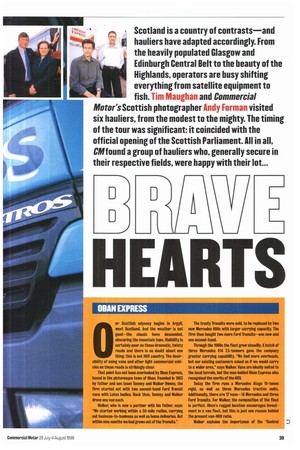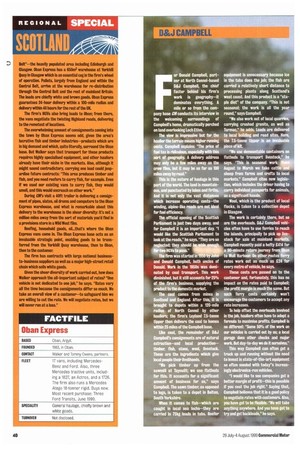HEARTS
Page 41

Page 42

If you've noticed an error in this article please click here to report it so we can fix it.
OBAN EXPRESS
Our Scottish odyssey begins in Argyll, west Scotland. And the weather is not good—the clouds have descended, obscuring the mountain tops. Visibility is certainly poor on these dramatic, twisty roads and there is no doubt about one thing: this is not HGV country. The desirability of using vans and other light commercial vehicles on these roads is strikingly clear.
That point has not been overlooked by Oban Express, based in the picturesque town of Oban. Founded in 1983 by father and son team Tommy and Walker Owens, the firm started out with two second-hand Ford Transit vans with Luton bodies. Back then, Tommy and Walker drove one van each.
Walker, who is now a partner with his father; says: "We started working within a 50-mile radius, carrying out business-to-business as well as home deliveries. But within nine months we had grown out of the Transits." The trusty Transits were sold, to be replaced by two new Mercedes 608s with larger carrying capacity. The firm then bought two more Ford Transits—one new and one second-hand.
Through the 1980s the fleet grew steadily. A batch of three Mercedes 814 7.5-tonners gave the company greater carrying capability. 'We had more overheads, but our existing customers asked us if we would carry to a wider area," says Walker. Vans are ideally suited to the local terrain, but the men behind Oban Express also recognised the merits of the RV Today the firm runs a Mercedes Atego 18-tonne rigid, as well as three Mercedes tractive units. Additionally, there are 17 vans-14 Mercedes and three Ford Transits. For Walker, the composition of the fleet is perfect. Oban's rugged location encourages investment in a van fleet, but this is just one reason behind the present van-HGV ratio.
Walker explains the importance of the "Central
Belt—the heavily populated area including Edinburgh and Glasgow. Oban Express has a 650m2 warehouse at Yorkhill Quay in Glasgow which is an essential cog in the firm's wheel of operation. Pallets. largely from England and within the Central Belt, arrive at the warehouse for re-distribution through the Central Belt and the rest of mainland Britain. The loads are chiefly white and brown goods. Man Express guarantees 24-hour delivery within a 100-mile radius and delivery within 48 hours for the rest of the UK,
The firm's Nils also bring loads to Oban; from there, the vans negotiate the twisting Highland roads, delivering to the remotest of locations, The overwhelming amount of consignments coming into the town by Ethan Express seems odd, given the area's lucrative fish and timber industries—products which are in big demand and which, quite literally, surround the Oban base. But Walker says that transport for these products requires highly specialised equipment, and other hauliers already have their niche in the markets. Also, although it might sound contradictory, carrying one load could jeopardise future contracts: "This area produces timber and fish, and you need reefers to carry fish, for example. Even if we used our existing vans to carry fish, they would smell, and this would encroach on other work.'
[luring CM'S visit a 40ft trailer is delivering a consignment of pipes, slates, oil drums and computers to the Oban Express warehouse, and what is remarkable about this delivery to the warehouse is the sheer diversity: it's not a million miles away from the sort of materials you'd find in a provisions store in a Wild West film.
Roofing, household goods. oil...that's where the Oban Express vans come in. The Oban Express base acts as an invaluable strategic point, enabling goods to be transferred from the Yorichill Quay warehouse, then to Oban, then to the customer.
The firm has contracts with large national businessto-business suppliers as well as a major high-street retail chain which sells white goods.
Given the sheer diversity of work carried out, how does Walker approach the all-important subject of rates? "One vehicle is not dedicated to one job," he says. "Rates vary all the time because the consignments differ so much. We take an overall view of a customer—to safeguard him we are willing to cut the rate. We will negotiate rates, but we will never run at a loss."












































































































